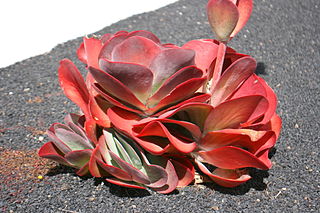Related Research Articles
In demonology, Raum is a Great Earl of Hell, ruling thirty legions of demons. He is depicted as a crow which adopts human form at the request of the conjurer.
"Raum, Reym (Rey) or Raim is a great earle, he is seene as a crowe, but when he putteth on humane shape, at the commandement of the exorcist, he stealeth woonderfullie out of the kings house, and carrieth it whether he is assigned, he destroieth cities, and hath great despite unto dignities, he knoweth things present, past, and to come, and reconcileth freends and foes, he was of the order of thrones, and governeth thirtie legions."

In stellar evolution, an FU Orionis star is a pre–main-sequence star which displays an extreme change in magnitude and spectral type. One example is the star V1057 Cyg, which became 6 magnitudes brighter and went from spectral type dKe to F-type supergiant. These stars are named after their type-star, FU Orionis.

The Battle of Derna at Derna, Cyrenaica, was the decisive victory in April–May 1805 of a mercenary army recruited and led by United States Marines under the command of U.S. Army Lieutenant William Eaton, diplomatic Consul to Tripoli, and U.S. Marine Corps First Lieutenant Presley Neville O'Bannon. The battle involved a forced 521-mile (839-km) march through the North African desert from Alexandria, Egypt, to the eastern port city of Derna, Libya, which was defended by a much larger force.
Yusuf Karamanli, Caramanli or Qaramanli or al-Qaramanli, was the best-known Pasha of the Karamanli dynasty (1711–1835) of Tripolitania.

Kalanchoe daigremontiana, formerly known as Bryophyllum daigremontianum and commonly called mother of thousands, alligator plant, or Mexican hat plant is a succulent plant native to Madagascar. Like other members of Bryophyllum, it can propagate vegetatively from plantlets that develop on its leaf margins. All parts of this species contain a very toxic steroid known as daigremontianin.

The gastric inhibitory polypeptide receptor (GIP-R), also known as the glucose-dependent insulinotropic polypeptide receptor, is a protein that in humans is encoded by the GIPR gene. GIP-R is a member of the 7-transmembrane protein family, a class of G protein

Rosularia is a small genus of the family Crassulaceae. It includes about 28-35 species from Europe, the Himalayas, and northern Africa.

Sinocrassula is a genus of succulent, subtropical plants of the family Crassulaceae.

Kalanchoe fedtschenkoi, formerly known as Bryophyllum fedtschenkoi, native to Madagascar, is widely sold as a house or garden plant that has established itself in the wild in some southern parts of the United States of America. Its specific epithet fedtschenkoi honors botanist Boris Fedtschenko (1873-1947).

The battle of Alboran took place on 1 October 1540 off the isle of Alboran during the Ottoman-Habsburg struggle for the control of the Mediterranean when a Spanish fleet under the command of Bernardino de Mendoza destroyed an Ottoman fleet commanded by Ali Hamet, sinking a galley and capturing 10 other ships.

The Tripolitanian civil war was a conflict from 1793 to 1795 which occurred in what is today the country of Libya. Ali Benghul, an Ottoman officer, deposed Hamet Karamanli, the ruler of Tripolitania, who had ruled since the end of the corrupt and ineffective rule of Ali I in 1793. Hamet and his brother Yusuf returned to Tripoli with the aid of the Bey of Tunis and took control of the throne.

Kalanchoe manginii, beach bells, is a species of flowering plant in the family Crassulaceae, native to Madagascar. It is an evergreen succulent perennial growing to 30 cm (12 in) tall and wide, with arching branches of rounded, glossy leaves, and urn-shaped salmon-red flowers in spring. As the minimum temperature for growth is 10 °C (50 °F), in temperate regions this plant must be grown under glass as a houseplant.

Tripoli is a 1950 American adventure film directed by Will Price and written by Winston Miller. The film is a fictionalized account of the Battle of Derna at Derna, a coastal town in modern eastern Libya in April 1805 against Tripoli, one of the four Barbary states in North Africa and stars John Payne, Maureen O'Hara, Howard Da Silva, Phillip Reed, Grant Withers, Lowell Gilmore and Connie Gilchrist. The film was released on November 9, 1950, by Paramount Pictures.

Louis Gustave Chauveaud was a French botanist, known for his studies of plant anatomy.

Doxifluridine is a second generation nucleoside analog prodrug developed by Roche and used as a cytostatic agent in chemotherapy in several Asian countries including China and South Korea. Doxifluridine is not FDA-approved for use in the USA. It is currently being evaluated in several clinical trials as a stand-alone or combination therapy treatment.

Hiram Wild was an English botanist who worked in Southern Rhodesia. The standard author abbreviation Wild is used to indicate this person as the author when citing a botanical name.
Kalanchoe × poincarei is a species of Kalanchoe native to southern Madagascar. Its scientific name is often misapplied to K. suarezensis and K. mortagei, but K. × poincarei is very different from them. The true K. × poincarei is a natural hybrid involving K. beauverdii, with similar sprawling stems up to 3 m in length, and not known in cultivation, whereas K. suarezensis and K. mortagei are erect, 30~60 cm tall and cultivated as ornamentals.

Kalanchoe luciae, the paddle plant, is a species of flowering plant in the genus Kalanchoe, native to northeast South Africa, Swaziland, Mozambique and Zimbabwe. It has gained the Royal Horticultural Society's Award of Garden Merit.
References
- ↑ "Search term = kungia". Tropicos. Missouri Botanical Gardens. Retrieved 22 November 2017.